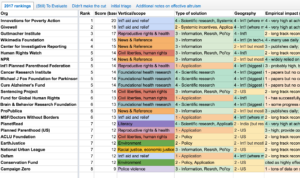Doing something small but meaningful
Post-US election, I’ve seen some advice on how to have impact (mostly focused on political impact) through small but meaningful actions, and do so sustainably. I wanted to start collecting such resources here.
A friend wrote on how to be more politically involved without burnout:
1. I know donating money doesn’t feel like doing a lot, but it’s often the most effective and efficient way you can help people or push for change. Setting up automatic monthly donations to your organizations of choice is extremely helpful because it allows them to plan effectively over the longer term rather than trying to figure out what to do with a sudden windfall or figure out how to make up an unexpected shortage. Check whether your employer has a matching program for extra leverage!
2. I looked at my weekly schedule and found a few places I reliably have time to make phone calls and do research (to figure out what I need to be making phone calls about and be sure I have enough background information)….
3. I am trying out a few local volunteer opportunities, and I’ll see what sticks in the long term. Â If [the first thing I try]Â doesn’t seem sustainable for me I’ll look for a different opportunity. When you are considering volunteer opportunities, look for things you will enjoy. Do you like talking to people? Do you enjoy manual labor? Would you like your volunteering better if you brought some friends with you, if you worked alone, or if you got to meet lots of new people?
4. Connecting with an organized group is a fantastic way to avoid reduplicating a lot of effort. I’m using the spreadsheet at https://docs.google.com/spreadsheets/d/174f0WBSVNSdcQ5_S6rWPGB3pNCsruyyM_ZRQ6QUhGmo/htmlview?usp=sharing&sle=true# to guide my calling efforts and short-circuit my dithering about how to rank the many important issues I could be working on….
6. Don’t think too hard about where to put your efforts. There are lots of different things you could be advocating for, donating to, or helping with. You don’t have to find the very best one! It’s really easy for me to get caught up in trying to figure out what the very most important issue is, and how I specifically can be the very most effective helper I can, but every minute devoted to trying to figure out what to do is a minute you aren’t actually doing the thing. Pick a set time to research — “I am going to find and compare organizations working to help people register to vote for the special elections in North Carolina for 30 minutes” — and then go from there. ( http://nc-democracy.org/give/ — they’re currently organizing, so they know money will help and they’ll be contacting me later in the month or in February to let me know what else I can do from out of state)…
More good advice at the link.  And I like that a lot of the advice also applies well to any cause (burnout is always an issue), which also giving concrete examples and resources for people who share the author’s causes.  Also, I miiiight be the kind of person frequently subject to analysis paralysis. ;)  So the last point is well taken.
Do Something, courtesy of Crooked Media, also has a bunch of resources with specific suggestions for actions.  Most very specifically are related to electing more Democrats and/or fighting Trump.  If those are your causes, check their links out. (To be clear about my own biases: I am mostly aligned with those causes, but try to keep this blog less partisan and more focused on effective solutions to specific issues.)  I’ve bookmarked the Indivisible Guide to dive into more later.  The subtitle is “Former congressional staffers reveal best practices for making Congress listen” — it looks like it’s got a lot of broadly applicable advice for getting things done within the US political system.
Comments off

